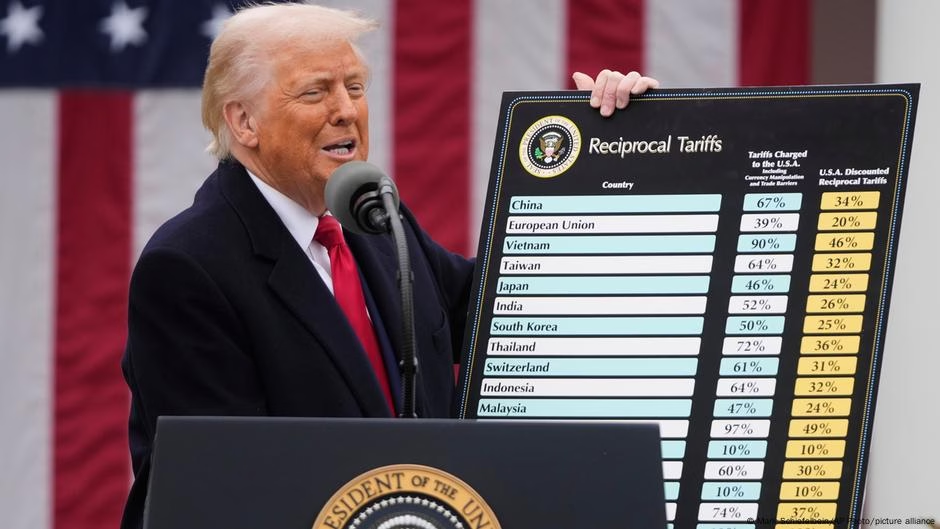US Treasury Secretary Scott Bessent told Fox News that existing sanctions render trade with Russia impossible. Since Russia’s invasion of Ukraine, the US and other countries, especially those in Europe, have intensified sanctions against Russia. White House spokeswoman Karoline Leavitt stated that the US sanctions would prevent “any meaningful trade” with Russia. But is this true?
Strategic goods from Russia
The United States Census Bureau asserts that trade with Russia has significantly decreased since its full-scale invasion of Ukraine: from approximately $36 billion (€32.9 billion) in 2021 to about $3.5 billion (€3.2 billion) in 2024.
Bessent’s statement that there is no trade with Russia doesn’t accurately represent the reality that imports from the country, although reduced, are still significant for the US, especially for strategic goods like fertilizers and inorganic chemicals.
Despite the trade with Russia being one-tenth of its former level, its exclusion from Trump’s new tariffs cannot solely be justified by existing sanctions and declining import figures.
In comparison, Washington is imposing 27% tariffs on imports from Kazakhstan, with trade volume comparable to that with Russia. However, Ukraine, with a lower trade volume, faces a 10% punitive tariff on Trump’s list.
‘Symbolic leniency’
While several sanctioned countries like Venezuela also feature on Trump’s tariff list, others under sanctions including Russia, North Korea, Cuba, and Belarus remain exempt from the new measures.
“This appears to be symbolic leniency,” according to political scientist and American studies expert Alexandra Filippenko, speaking to DW.
Although the US hasn’t released figures on trade with North Korea, Cuba, and Belarus, UN estimates suggest that bilateral trade with Belarus, for instance, amounts to tens of millions of dollars annually. In 2024, Belarusian goods worth $21 million (€19.1 million) were imported into the US.
The tariff list doesn’t seem to be based solely on a country’s trade volume, as even small or uninhabited territories like the Heard and McDonald Islands are affected.
Canada and Mexico are also not on the new list, although most goods imported from these countries are already subject to existing tariffs of 25 percent.
Why is Russia exempt?
Political scientist Alexandra Filippenko views Trump’s exclusion of Russia from the tariff list as a clear indication of a priority to improve relations with Moscow. “The Russian authorities have understood this political signal,” she said, referring to a Telegram post by Russian President’s special envoy, Kirill Dmitriev, who is currently in Washington. Dmitriev stated that while the restoration of dialogue is difficult and gradual, “each meeting, each open conversation allows us to move forward.”
Nina Khrushcheva, a professor of international affairs at The New School in New York, also sees diplomacy as a possible reason for Trump to refrain from imposing tariffs on Russia. “I believe political pressure will be applied to Russia in one way or another, but during Dmitriev’s visit, tariffs are rather counterproductive,” she told DW.
Oleg Buklemishev, Director of the Center for Economic Policy Research at Moscow State University, on the other hand, considers Trump’s decisions on Russia and Ukraine to be “economically illogical.”
He also sees the decision to not impose additional tariffs on Russia as political, despite Washington’s claims of insignificant bilateral trade. Russian nuclear fuel, fertilizers, and platinum metals continue to be supplied to the US, and high tariffs could lead to increased energy costs, Buklemishev argues.
Moreover, he emphasizes that current trade with Russia, significantly reduced from its former level, is far from comparable to European or Chinese markets.
A return to substantial trade between Russia and the US is unrealistic, Buklemishev said. “Even with eased relations, returning to the previous trade level would be impossible. Financial, logistical, and sanctions-related restrictions will persist, and China has already partially taken over the Russian market.”
This article is based on a piece originally written in German.








